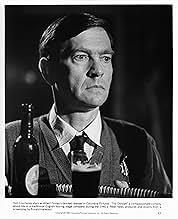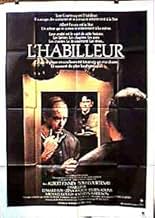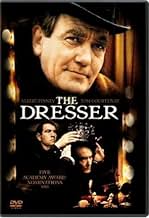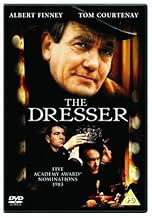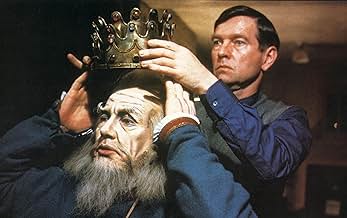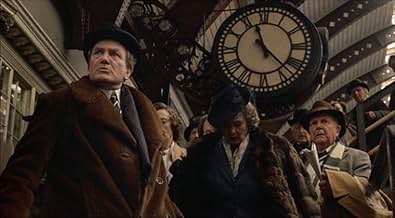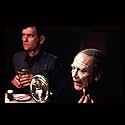VALUTAZIONE IMDb
7,5/10
6006
LA TUA VALUTAZIONE
Aggiungi una trama nella tua linguaPersonal assistant Norman struggles to get deteriorating veteran actor Sir through a difficult performance of King Lear.Personal assistant Norman struggles to get deteriorating veteran actor Sir through a difficult performance of King Lear.Personal assistant Norman struggles to get deteriorating veteran actor Sir through a difficult performance of King Lear.
- Candidato a 5 Oscar
- 5 vittorie e 17 candidature totali
Anne Blackman
- Beryl
- (as Anne Mannion)
Recensioni in evidenza
I just watched The Dresser this evening, having only seen it once before, about a dozen years ago.
It's not a "big" movie, and doesn't try to make a big splash, but my God, the brilliance of the two leads leaves me just about speechless. Albert Finney and Tom Courtenay are nothing less than amazing in this movie.
The Dresser is the story of Sir, an aging Shakespearean actor (Finney), and his dresser Norman (Courtenay), sort of a valet, putting on a production of King Lear during the blitz of London in World War II. These are two men, each dependent upon the other: Sir is almost helpless without the aid of Norman to cajole, wheedle, and bully him into getting onstage for his 227th performance of Lear. And Norman lives his life vicariously through Sir; without Sir to need him, he is nothing, or thinks he is, anyway.
This is a character-driven film; the plot is secondary to the interaction of the characters, and as such, it requires actors of the highest caliber to bring it to life. Finney, only 47 years old, is completely believable as a very old, very sick, petulant, bullying, but brilliant stage actor. He hisses and fumes at his fellow actors even when they're taking their bows! And Courtenay is no less convincing as the mincing dresser, who must sometimes act more as a mother than as a valet to his elderly employer. Employer is really the wrong term to use, though. For although, technically their relationship is that of employer and employee, most of the time Sir and Norman act like nothing so much as an old married couple.
Yes, there are others in the cast of this movie, but there is no question that the true stars are Finney, Courtenay, and the marvelous script by Ronald Harwood. That is not to say that there aren't other fine performances, most notably Eileen Atkins as the long-suffering stage manager Madge. There is a wonderful scene where Sir and Madge talk about old desires, old regrets, and what might have been.
Although it doesn't get talked about these days, it is worth remembering that The Dresser was nominated for five Academy Awards: Best Actor nominations for both Finney and Courtenay, Best Picture, Best Director (Peter Yates), and Best Adapted Screenplay.
I had remembered this as being a good movie, but I wasn't prepared to be as completely mesmerized as I was from beginning to end. If you want to see an example of what great acting is all about, and be hugely entertained all the while, then I encourage you to see The Dresser.
It's not a "big" movie, and doesn't try to make a big splash, but my God, the brilliance of the two leads leaves me just about speechless. Albert Finney and Tom Courtenay are nothing less than amazing in this movie.
The Dresser is the story of Sir, an aging Shakespearean actor (Finney), and his dresser Norman (Courtenay), sort of a valet, putting on a production of King Lear during the blitz of London in World War II. These are two men, each dependent upon the other: Sir is almost helpless without the aid of Norman to cajole, wheedle, and bully him into getting onstage for his 227th performance of Lear. And Norman lives his life vicariously through Sir; without Sir to need him, he is nothing, or thinks he is, anyway.
This is a character-driven film; the plot is secondary to the interaction of the characters, and as such, it requires actors of the highest caliber to bring it to life. Finney, only 47 years old, is completely believable as a very old, very sick, petulant, bullying, but brilliant stage actor. He hisses and fumes at his fellow actors even when they're taking their bows! And Courtenay is no less convincing as the mincing dresser, who must sometimes act more as a mother than as a valet to his elderly employer. Employer is really the wrong term to use, though. For although, technically their relationship is that of employer and employee, most of the time Sir and Norman act like nothing so much as an old married couple.
Yes, there are others in the cast of this movie, but there is no question that the true stars are Finney, Courtenay, and the marvelous script by Ronald Harwood. That is not to say that there aren't other fine performances, most notably Eileen Atkins as the long-suffering stage manager Madge. There is a wonderful scene where Sir and Madge talk about old desires, old regrets, and what might have been.
Although it doesn't get talked about these days, it is worth remembering that The Dresser was nominated for five Academy Awards: Best Actor nominations for both Finney and Courtenay, Best Picture, Best Director (Peter Yates), and Best Adapted Screenplay.
I had remembered this as being a good movie, but I wasn't prepared to be as completely mesmerized as I was from beginning to end. If you want to see an example of what great acting is all about, and be hugely entertained all the while, then I encourage you to see The Dresser.
This is a movie that deserves another look--if you haven't seen it for a while, or a first look--if you were too young when it came out (1983). Based on a play by the same name, it is the story of an older actor who heads a touring Shakespearean repertory company in England during World War II. It deals with his stress of trying to perform a Shakespeare each night while facing problems such as bombed theaters and a company made up of older or physically handicapped actors--the young, able bodied ones being taken for military service. It also deals with his relationship with various members of his company, especially with his dresser. So far it all sounds rather dull but nothing could be further from the truth. While tragic overall, the story is told with a lot of humor and emotions run high throughout. The two male leads both received Oscar nominations for best actor and deservedly so. I strongly recommend this movie to anyone who enjoys human drama, theater--especially Shakespeare, or who has ever worked backstage in any capacity. The backstage goings-on make up another facet of the movie that will be fascinating to most viewers.
Albert Finney and Tom Courtenay are brilliant as Sir and his Dresser. Of course the play is brilliant to begin with and nothing can compare with the immediacy and collegiality of theatre, and I think you listen better in theatre; but on the screen we become more intimate, we're 'up-close' more than we are in the theatre, we witness subtle changes in expression, we "see" better as well as listen. Both the play and the movie are wondrous: moving, intelligent, illuminating--of the backstage story of the company, of historical context, of the two main characters, and of the parallel characters in "Lear" itself. If you cannot get to see it in a theatre (I don't imagine it's produced much these days) then, please, do yourself a favor, and get the video.
What happens backstage is always true drama. And often pure comedy. Such is the case of The Dresser, a film about an effeminate wardrobe man who is devoted to the deteriorating lead of the acting troupe he travels with. The film takes place in one night about a particularly difficult performance of William Shakespeare's King Lear. Albert Finney plays Sir, the lead role of the performance. He is in no condition to perform such a difficult role, yet he perseveres anyways with the help of his Dresser, Norman (Tom Courtenay). The two powerful leads are the highlight of this beautiful film.
The Dresser is what acting is all about. It is an intriguing blend of film acting and stage acting. Albert Finney and Tom Courtenay give exquisite and robust performances. Their conflicting personalities make them a delightful pair to watch interact. The acting in this film has the kind of prowess and impact of a stage performance with its loud and exaggerated movements. This kind of acting only works in certain settings, and The Dresser is a perfect example of where it not only works but is very necessary. It allows for a detachment from reality, drawing one into the theatrical world, something which stands out in such a unique and perplexing way.
Peter Yates directs this film with precise and aesthetically glamorous grandeur. It is a grand film that doesn't go too far out of line and never gets lost in itself. Yates directs with a keen eye for subtle detail and sparkling brilliance. The film is written with the same kind of subdued wit and beauty, making the film fit together nicely. The dialouge is great and the actors who deliver it bring so much life to the characters and script that it makes for a brilliant expose of the acting world.
The Dresser is a great film that accomplishes beauty and immersion without an immaculate setting. The film is subtly fantastic. Definitely check this one out.
The Dresser is what acting is all about. It is an intriguing blend of film acting and stage acting. Albert Finney and Tom Courtenay give exquisite and robust performances. Their conflicting personalities make them a delightful pair to watch interact. The acting in this film has the kind of prowess and impact of a stage performance with its loud and exaggerated movements. This kind of acting only works in certain settings, and The Dresser is a perfect example of where it not only works but is very necessary. It allows for a detachment from reality, drawing one into the theatrical world, something which stands out in such a unique and perplexing way.
Peter Yates directs this film with precise and aesthetically glamorous grandeur. It is a grand film that doesn't go too far out of line and never gets lost in itself. Yates directs with a keen eye for subtle detail and sparkling brilliance. The film is written with the same kind of subdued wit and beauty, making the film fit together nicely. The dialouge is great and the actors who deliver it bring so much life to the characters and script that it makes for a brilliant expose of the acting world.
The Dresser is a great film that accomplishes beauty and immersion without an immaculate setting. The film is subtly fantastic. Definitely check this one out.
Based on Harwood's successful play of 1980, THE DRESSER details the relationship between "Sir" (Albert Finney), an actor/manager of the old school and Norman, his dresser (Tom Courtenay).
Set largely in and around the streets of Bradford, Yorkshire, Peter Yates' film offers a vivid recreation of performing Shakespeare during an air-raid, when the actors had to announce to the audience that they would continue the play, despite the risk of being hit by a stray bomb. To a man and a woman, the audience stay put to enjoy "Sir" playing King Lear; this was precisely what happened in most theaters. Yates captures the cramped backstage conditions in a Victorian theater (part of the No.1 touring circuit); the dressing- rooms shared by most of "Sir"'s company, and the cramped wings where the actors waited for their entrances and exits, while the backstage staff (such as they were) had to provide the sound-effects using primitive materials such as a kettledrum, a wind-machine and a thunder sheet. With little or no real opportunity to purchase new things, the company have to make do and mend: for example, purchasing cornflour to use as impromptu make-up for their Shakespearean repertoire.
Based partly on the experiences of Donald Wolfit - who was not a 'ham' actor (as some reviewers have suggested), but a performer of the old school - THE DRESSER shows "Sir's" dedication to continue touring, despite being manifestly unable to do so. Tormented by the ghosts of actors past, he believes that he can no longer give of his best; the only way he can be patched up to go onstage is through Norman's continual promptings. Finney captures the monstrous egotism of the man - who can be downright cruel to his fellow-actors yet in the next moment behave like a baby needing comfort from his carers. "Sir's" acting-style can best be described as full-on, complete with extravagant gestures and meaningful pauses. It might seem exaggerated to modern viewers, but to wartime audiences in England his productions provided much-needed respite from the strains of having to survive. The production design (by Stephen Grimes) owes a lot to Wolfit's inspiration; "Sir's" costume as Lear, and the settings are both based on the designs used in the actor/manager's stage production, which played from 1943 to 1953.
As Norman, Tom Courtenay is a protean figure - at once solicitous, angry, kind, vain, jealous and loyal. His entire life revolves around "Sir"; however much he might object to his employer's behavior. At the end he is bereft, as Sir passes away, and Norman wrings his hands and wails "What am I going to do?" Like the loyal stage-manager Madge (Eileen Atkins), he has been working in this touring company for a long time with no real thanks; and the fact that his name has been omitted from Sir's dedication in the opening paragraph of his (unfinished) autobiography proves especially galling for the Dresser. On the other hand, both Norman and Madge emphasize the strong sense of loyalty that dominated the old touring companies; despite meager salaries, poor living-conditions and indifferent treatment from their employer, they refused to do anything else, in the belief they were part of "one big happy family."
The casting of minor roles in THE DRESSER has been carefully thought out. Lockwood West makes an endearing Geoffrey, an elderly actor pitchforked into playing the role of Lear's Fool, although manifestly unsuited to the role. His equally elderly colleague Horace Brown is played by Llewellyn Rees, whose previous employment included a spell as Donald Wolfit's company manager in the early Fifties. Edward Fox turns in a malicious performance as Oxenby, a lame actor with a barely-suppressed hatred for Sir's authority.
Although three decades old, THE DRESSER remains a highly entertaining piece, as well as being a valuable recreation of an important moment in British theatrical history which remains comparatively neglected by scholars.
Set largely in and around the streets of Bradford, Yorkshire, Peter Yates' film offers a vivid recreation of performing Shakespeare during an air-raid, when the actors had to announce to the audience that they would continue the play, despite the risk of being hit by a stray bomb. To a man and a woman, the audience stay put to enjoy "Sir" playing King Lear; this was precisely what happened in most theaters. Yates captures the cramped backstage conditions in a Victorian theater (part of the No.1 touring circuit); the dressing- rooms shared by most of "Sir"'s company, and the cramped wings where the actors waited for their entrances and exits, while the backstage staff (such as they were) had to provide the sound-effects using primitive materials such as a kettledrum, a wind-machine and a thunder sheet. With little or no real opportunity to purchase new things, the company have to make do and mend: for example, purchasing cornflour to use as impromptu make-up for their Shakespearean repertoire.
Based partly on the experiences of Donald Wolfit - who was not a 'ham' actor (as some reviewers have suggested), but a performer of the old school - THE DRESSER shows "Sir's" dedication to continue touring, despite being manifestly unable to do so. Tormented by the ghosts of actors past, he believes that he can no longer give of his best; the only way he can be patched up to go onstage is through Norman's continual promptings. Finney captures the monstrous egotism of the man - who can be downright cruel to his fellow-actors yet in the next moment behave like a baby needing comfort from his carers. "Sir's" acting-style can best be described as full-on, complete with extravagant gestures and meaningful pauses. It might seem exaggerated to modern viewers, but to wartime audiences in England his productions provided much-needed respite from the strains of having to survive. The production design (by Stephen Grimes) owes a lot to Wolfit's inspiration; "Sir's" costume as Lear, and the settings are both based on the designs used in the actor/manager's stage production, which played from 1943 to 1953.
As Norman, Tom Courtenay is a protean figure - at once solicitous, angry, kind, vain, jealous and loyal. His entire life revolves around "Sir"; however much he might object to his employer's behavior. At the end he is bereft, as Sir passes away, and Norman wrings his hands and wails "What am I going to do?" Like the loyal stage-manager Madge (Eileen Atkins), he has been working in this touring company for a long time with no real thanks; and the fact that his name has been omitted from Sir's dedication in the opening paragraph of his (unfinished) autobiography proves especially galling for the Dresser. On the other hand, both Norman and Madge emphasize the strong sense of loyalty that dominated the old touring companies; despite meager salaries, poor living-conditions and indifferent treatment from their employer, they refused to do anything else, in the belief they were part of "one big happy family."
The casting of minor roles in THE DRESSER has been carefully thought out. Lockwood West makes an endearing Geoffrey, an elderly actor pitchforked into playing the role of Lear's Fool, although manifestly unsuited to the role. His equally elderly colleague Horace Brown is played by Llewellyn Rees, whose previous employment included a spell as Donald Wolfit's company manager in the early Fifties. Edward Fox turns in a malicious performance as Oxenby, a lame actor with a barely-suppressed hatred for Sir's authority.
Although three decades old, THE DRESSER remains a highly entertaining piece, as well as being a valuable recreation of an important moment in British theatrical history which remains comparatively neglected by scholars.
Lo sapevi?
- QuizRonald Harwood based his play "The Dresser", and this movie's subsequent screenplay, on the biography "Sir Donald Wolfit CBE: His life and work in the Unfashionable Theatre", and on his own experiences as an actor and dresser for renowned Shakespearian actor Donald Wolfit. Harwood's repertory ensemble, Shakespeare Company, frequently performed Shakespeare's plays, and Harwood was Wolfit's dresser between 1953 and 1958.
- BlooperAfter Sir and Norman leave the marketplace, they're passed by a Routemaster bus. These buses were first used in London in 1954, and weren't used outside London until the 1970's.
- ConnessioniEdited into The Clock (2010)
- Colonne sonore(We're Going To Hang Out) The Washing the Siegfried Line
(uncredited)
Music by Michael Carr
Lyrics by Jimmy Kennedy
Sung by Tom Courtenay (as Norman)
I più visti
Accedi per valutare e creare un elenco di titoli salvati per ottenere consigli personalizzati
- How long is The Dresser?Powered by Alexa
Dettagli
- Data di uscita
- Paese di origine
- Lingua
- Celebre anche come
- The Dresser
- Luoghi delle riprese
- Aziende produttrici
- Vedi altri crediti dell’azienda su IMDbPro
Botteghino
- Budget
- 1.456.000 £ (previsto)
- Lordo Stati Uniti e Canada
- 5.310.748 USD
- Lordo in tutto il mondo
- 5.310.748 USD
Contribuisci a questa pagina
Suggerisci una modifica o aggiungi i contenuti mancanti

Divario superiore
By what name was Il servo di scena (1983) officially released in India in English?
Rispondi

